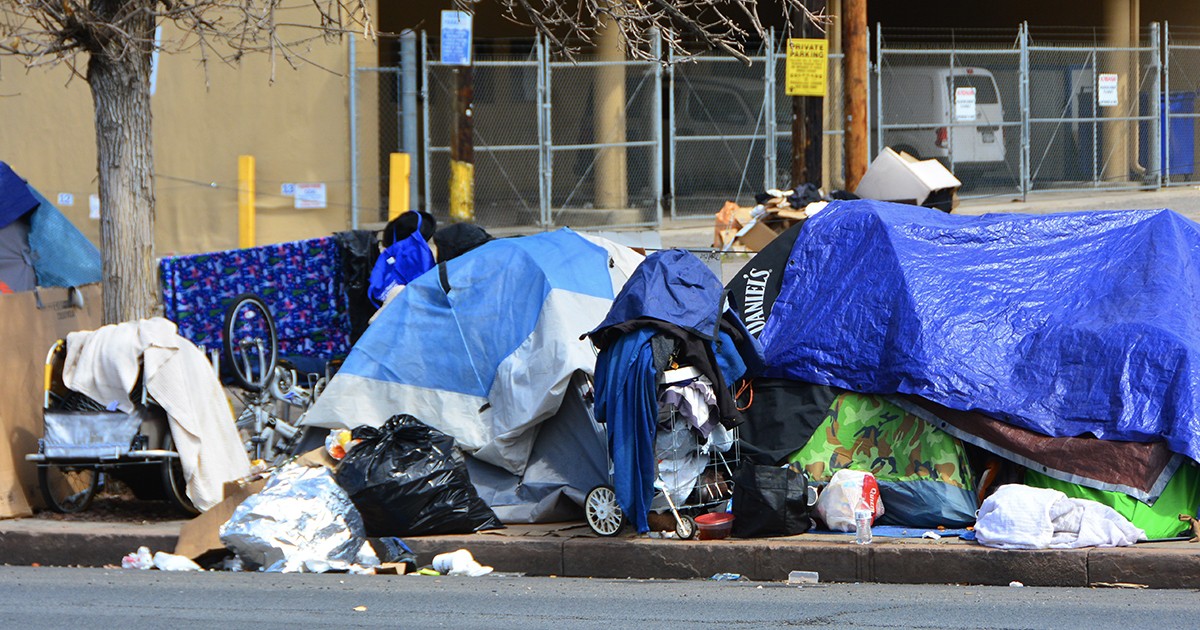
By Barbara “Bo” Jensen
I’m holding onto names that I need to let go. Instead, I’ve immortalized them in stone— eight-inch square tiles, each bearing one of these names, will be added to our healthcare center’s memorial wall.
Our clinic’s mission is to provide healthcare to the homeless; but it’s hard to see how we served these people. Even though they died during the pandemic, they didn’t die from coronavirus. They died from being out on the streets.
Before the pandemic, my job at our clinic was to manage the on-site art studio. With my studio assistants in their paint-smeared aprons, we welcomed everybody in, all those who slept in the razor-wire-fenced alleys of our industrial neighborhood. We invited them to explore new ways of seeing things, of seeing themselves, their unique creativity. Curious, people soon asked how to work the sewing machines, or where to get a canvas to paint, or “What time do you close?” They set down their heavy backpacks and their faded shopping bags, and they considered life through the lens of art.
Unburdened by survival for a few fleeting hours, sometimes fifty people sat together, painting and drawing, stitching, and carving. They laughed with each other and with the staff, some punchline rolling down the table from seat to seat, person to person, a wave of camaraderie washing over all of us in the bright studio.
***
When the pandemic came, I was forced to close the studio. The studio assistants and I came to work gloved and masked, filling in on the clinic’s street outreach. We’d hop in the big van in the morning and go scouting, looking for a virus we could not see, among people who were all but invisible, gathering information for the medical team who would follow in the afternoon.
You might think people on the streets wouldn’t want to tell us their names, but they did want to, first and last, date of birth, too. It was the promise that soon, they could talk to a doctor, that in the afternoon, we’d bring our medical providers back to that park, that intersection, that parking lot. Based on my word, person after person would step forward into a moment of vulnerability and tell me who they were, how they were feeling, what they were afraid of. I’d listen carefully, take notes. Before I turned to the next person, I would remind them what to watch for, the telltale cough, the rising fever, the feeling like you can’t breathe.
Some days, the doctors were so busy at the clinic that they couldn’t go on the afternoon medical outreach. It would be cancelled, often at the last minute. Already booked on other projects, I couldn’t go back out to find the people who had trusted me with their names and their fears, leaving them to wait, for hours, for a doctor who would never come.
I became angry, outraged, feeling like I’d been set up to cause harm; nevertheless, I had to swallow the indignation and continue with my work assignments. The truth was, I felt embarrassed and ashamed, having promised something to people with nothing. As if my word meant nothing. As if the people meant nothing.
I complained to the medical director, who promised to address the problem. Then she went out of town the next week, and while she was away, someone in upper management slammed on the brakes. By the cold tone of an email we received, each of us on outreach was informed that we would gather no names, no birthdates, no symptoms, only giving vague guidance to the doctors who would follow in the afternoons. If their schedules allowed.
***
Back at the closed studio, today, it’s begun raining. To keep us safe from each other, my assistants and I alternate our on-site project days. Surrounded by stacks of abandoned artwork, I clear off one table. Large framed paintings lean against the walls like tombstones.
On the empty table, I lay out sheets of paper, each marked with a big capital letter. Once I have my alphabet aligned in two neat columns, I walk over to the kiln and retrieve the rolling, stainless steel shelves holding plastic milk crates of completed memorial tiles. I roll the whole project over to my work space. Then I begin setting out the tiles by last name, methodically laying out people on top of the clean surface. I feel a chill, like I’m organizing a morgue, doing autopsies in this silent, sterile area.
***
This week, I’m going out in the mornings with one studio assistant. She’s all I have left, the others having already moved on to new jobs. The studio is still closed. We’re doing “art outreach” now, while awkwardly gloved and masked. The new grants for my program somehow came through; I get to figure out how to convince our funders that making art at picnic tables with frightened homeless people risking COVID-19 exposure counts as providing them valuable “open studio” sessions.
I look around at the people in this park as we arrive. One couple is dozing under a tree. A miserable guy at the far table looks like he’s trying to manage heroin withdrawal. Two other guys are passing a bottle of vodka. It’s nine-thirty in the morning.
We pop the trunk of the car and pull our supplies: Ziplock bags containing art kits we made in the studio, and bottled water.
“You need some water?” my assistant says, approaching the couple under the tree. They are glad to take it, and she engages them in conversation, handing them art projects, a way to kill time.
***
Once I have the tiles alphabetized, I go back through my lists, double-checking that we got them all—all 144 names. As each page is checked off, I stack those tiles back in a milk crate, tracing the familiar names with my fingers. Then I lay the completed paper on top like a cold, white shroud.